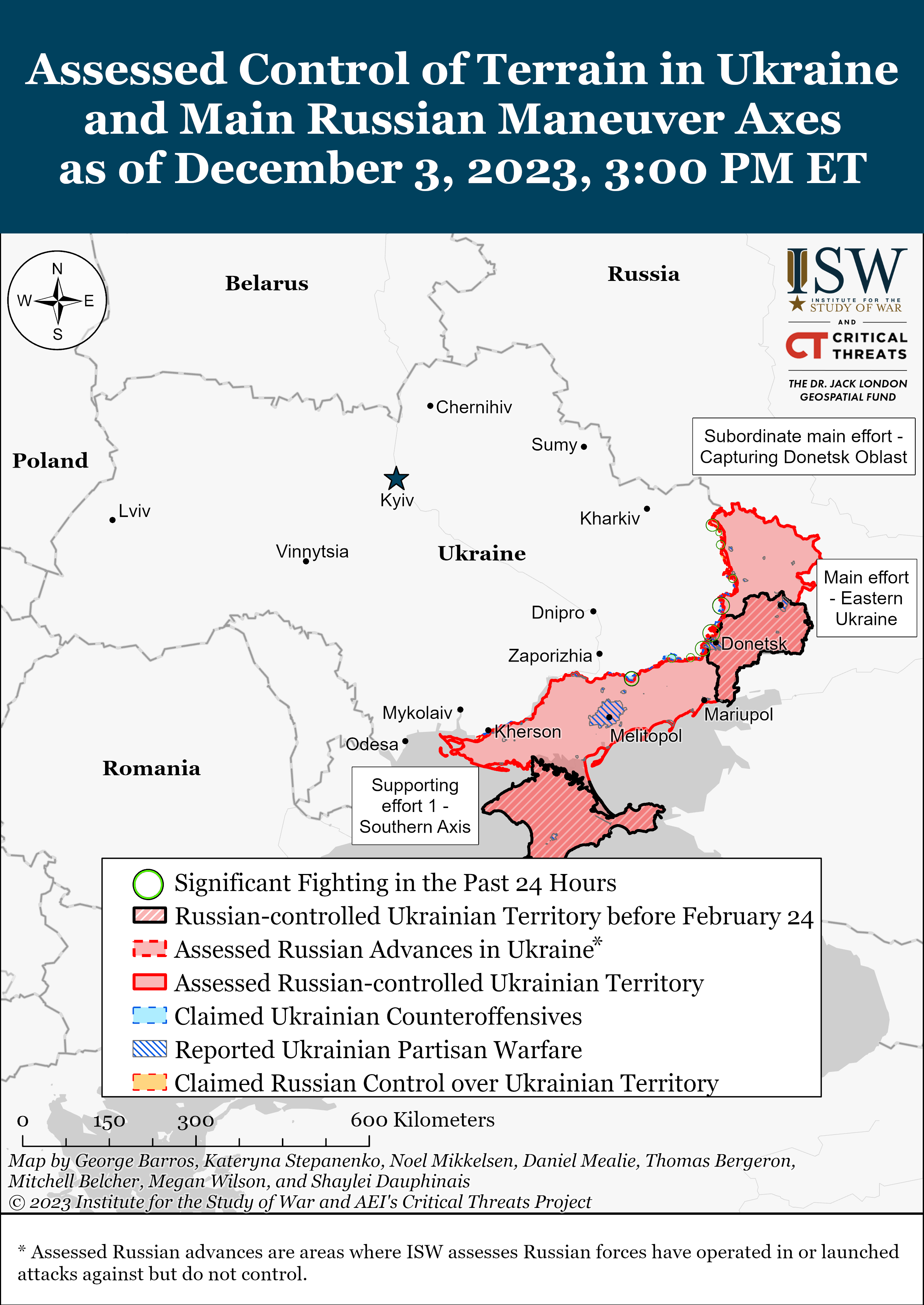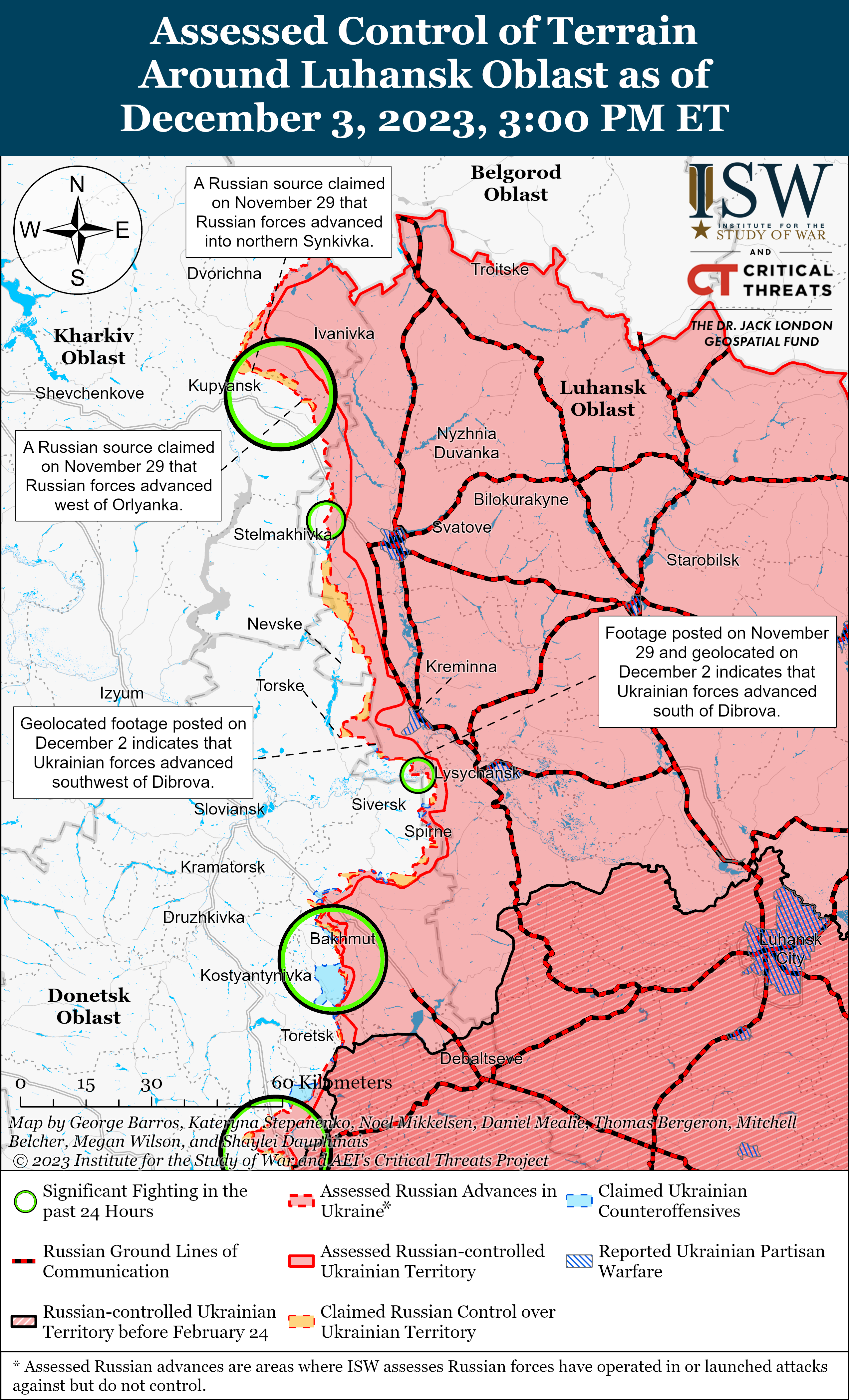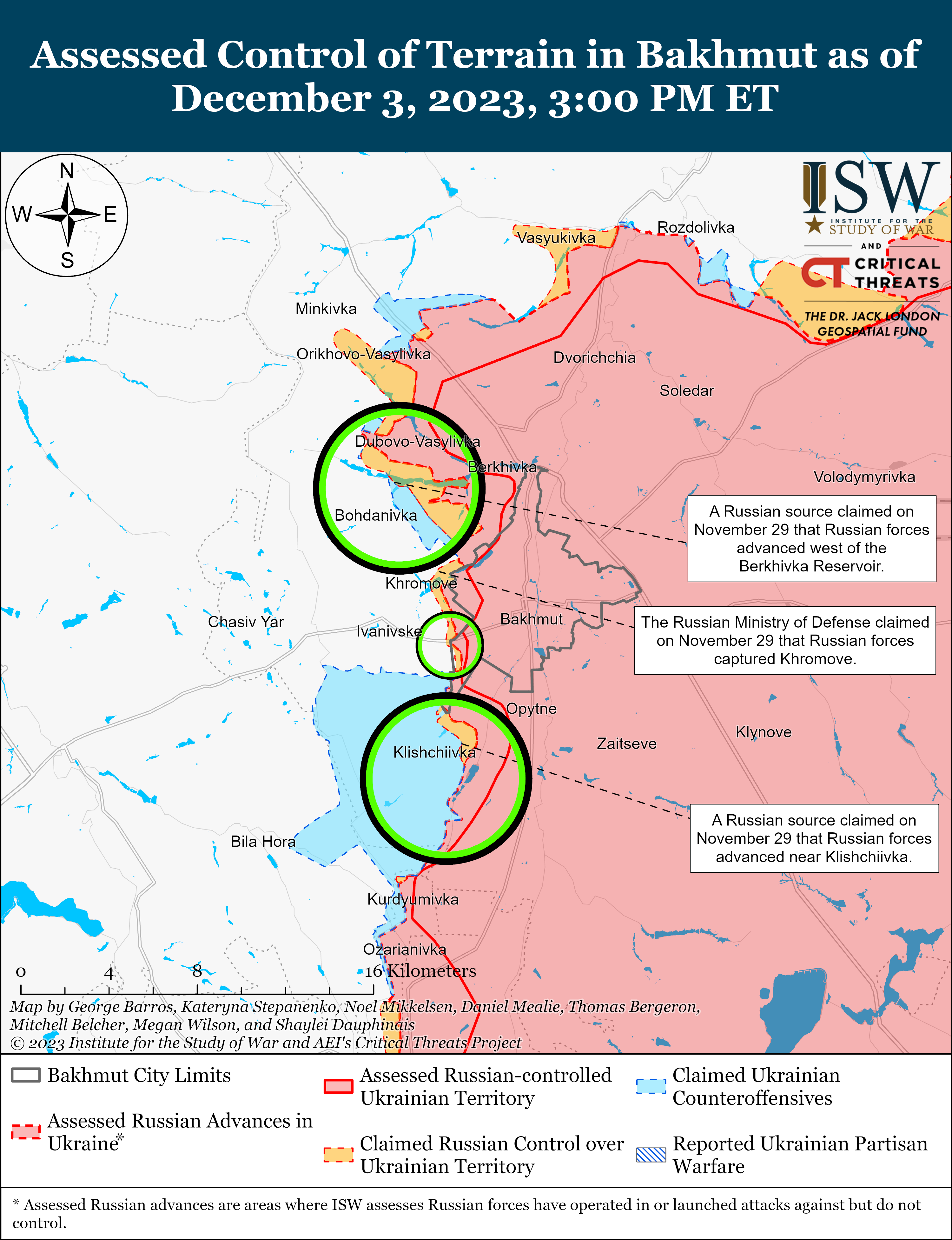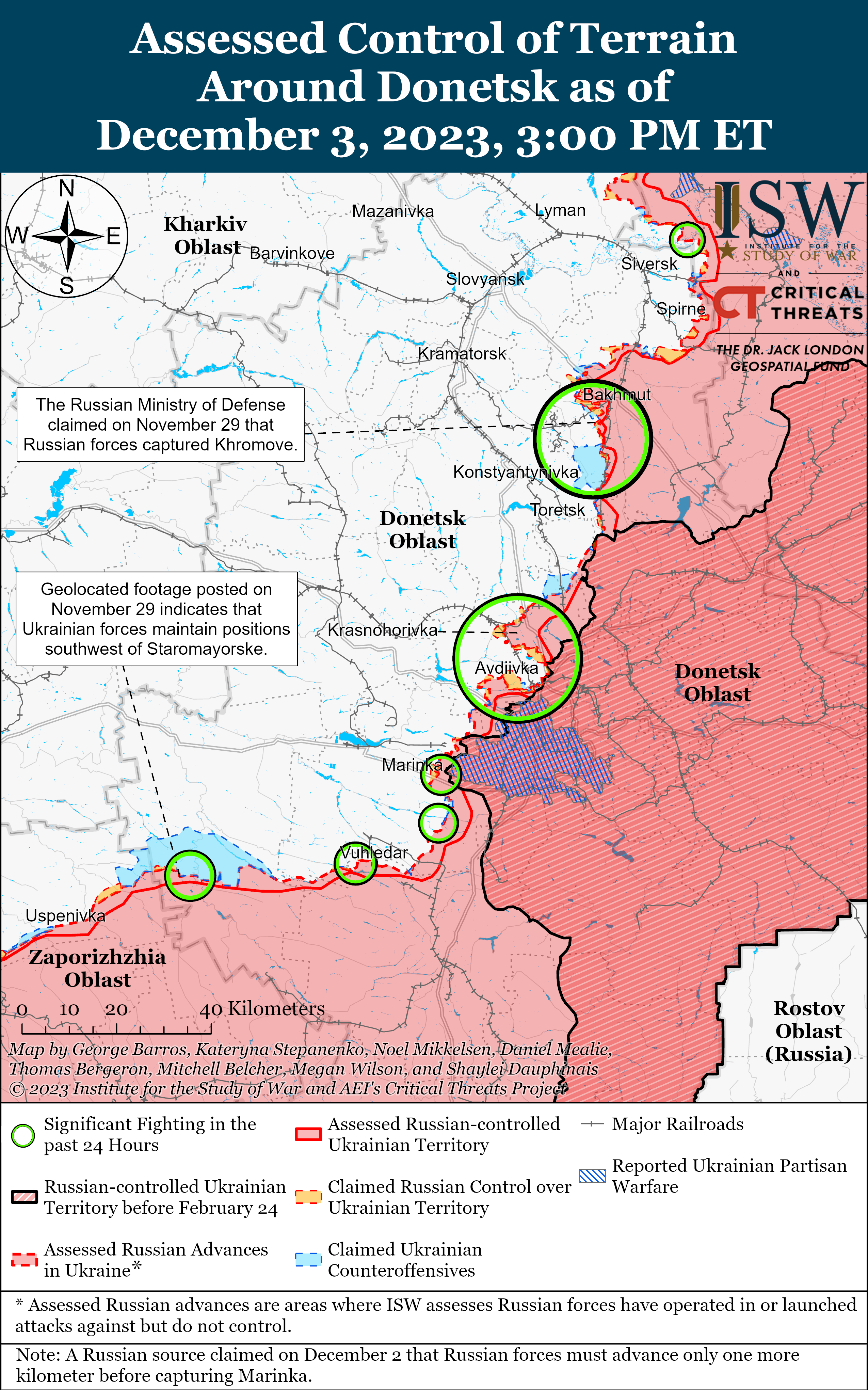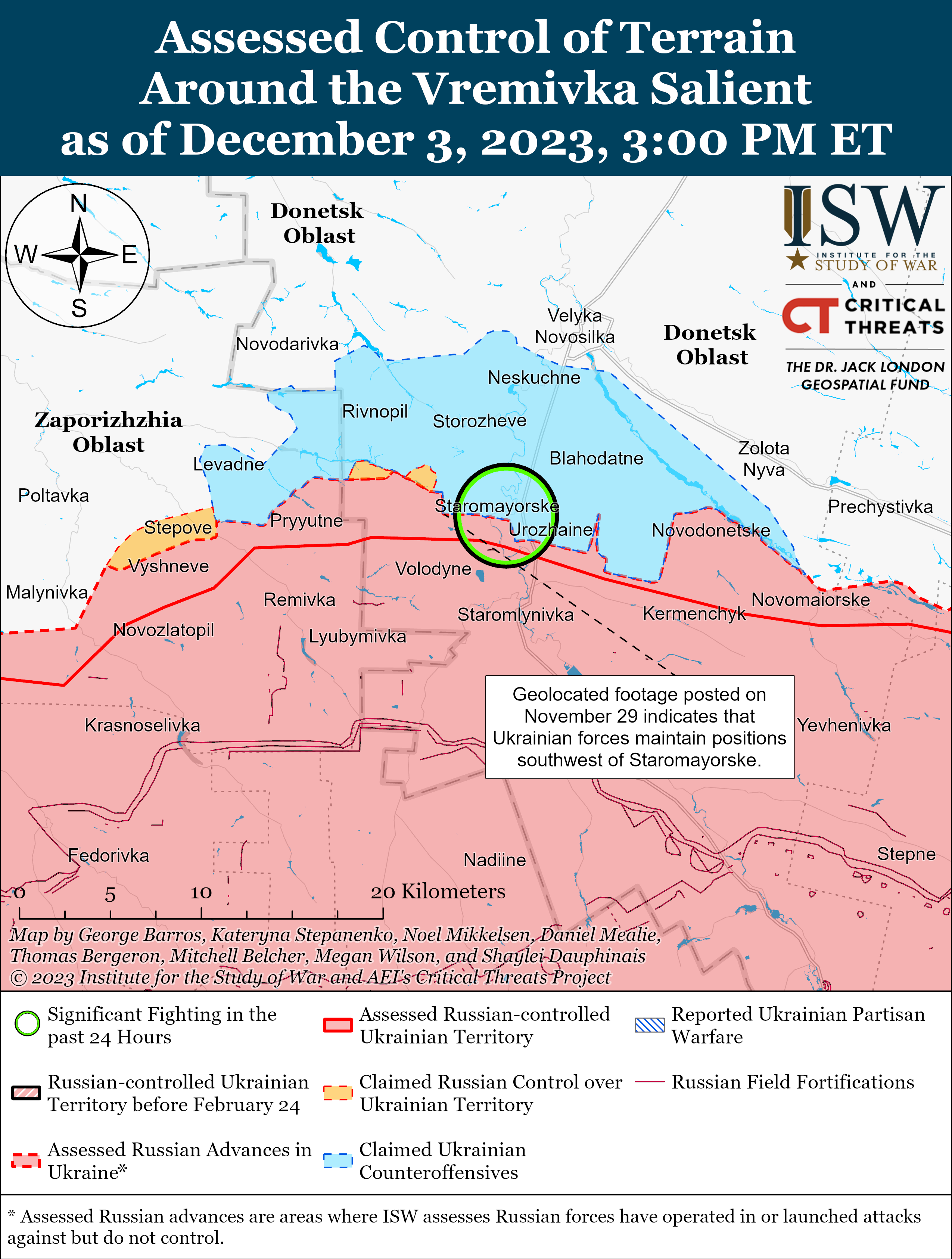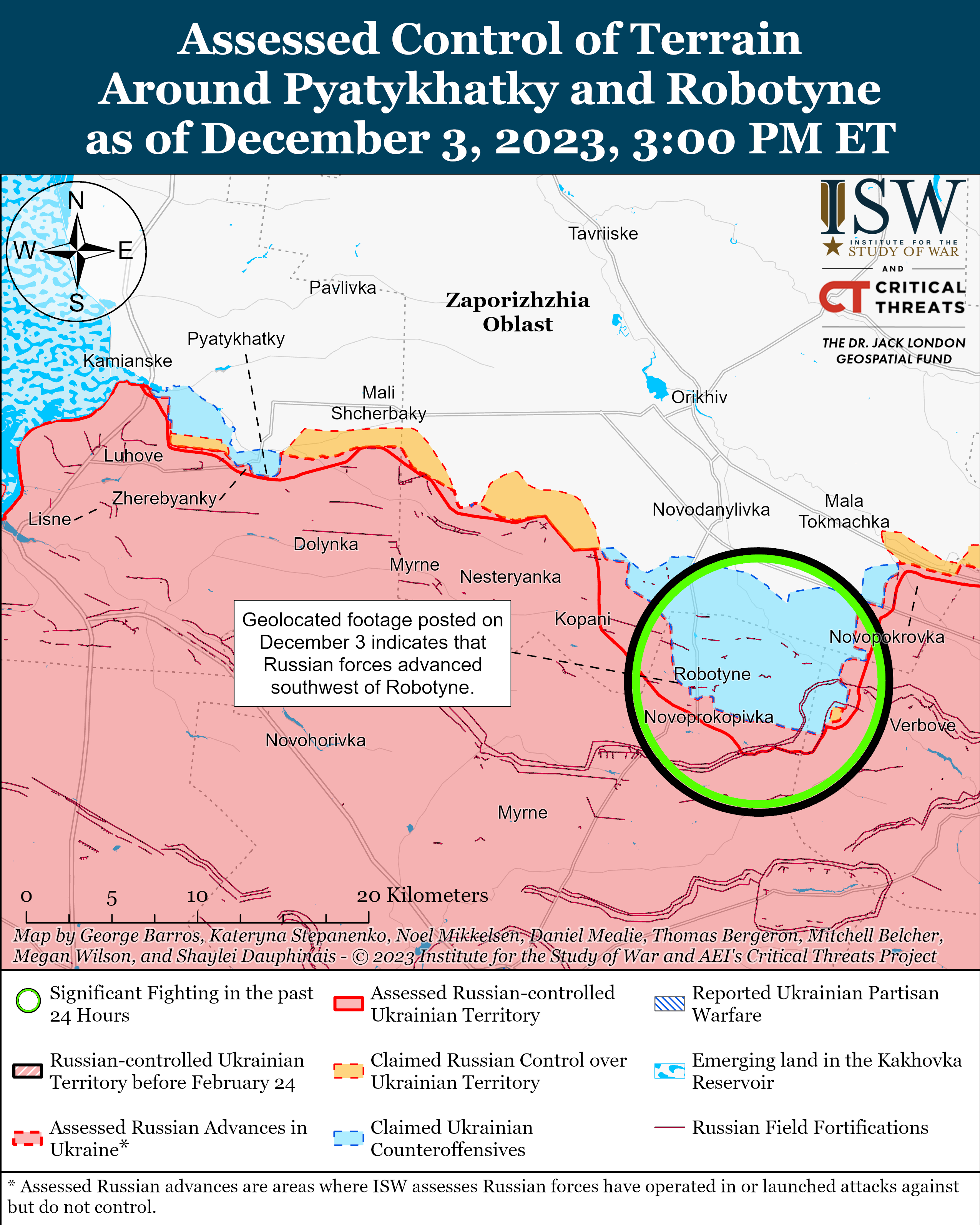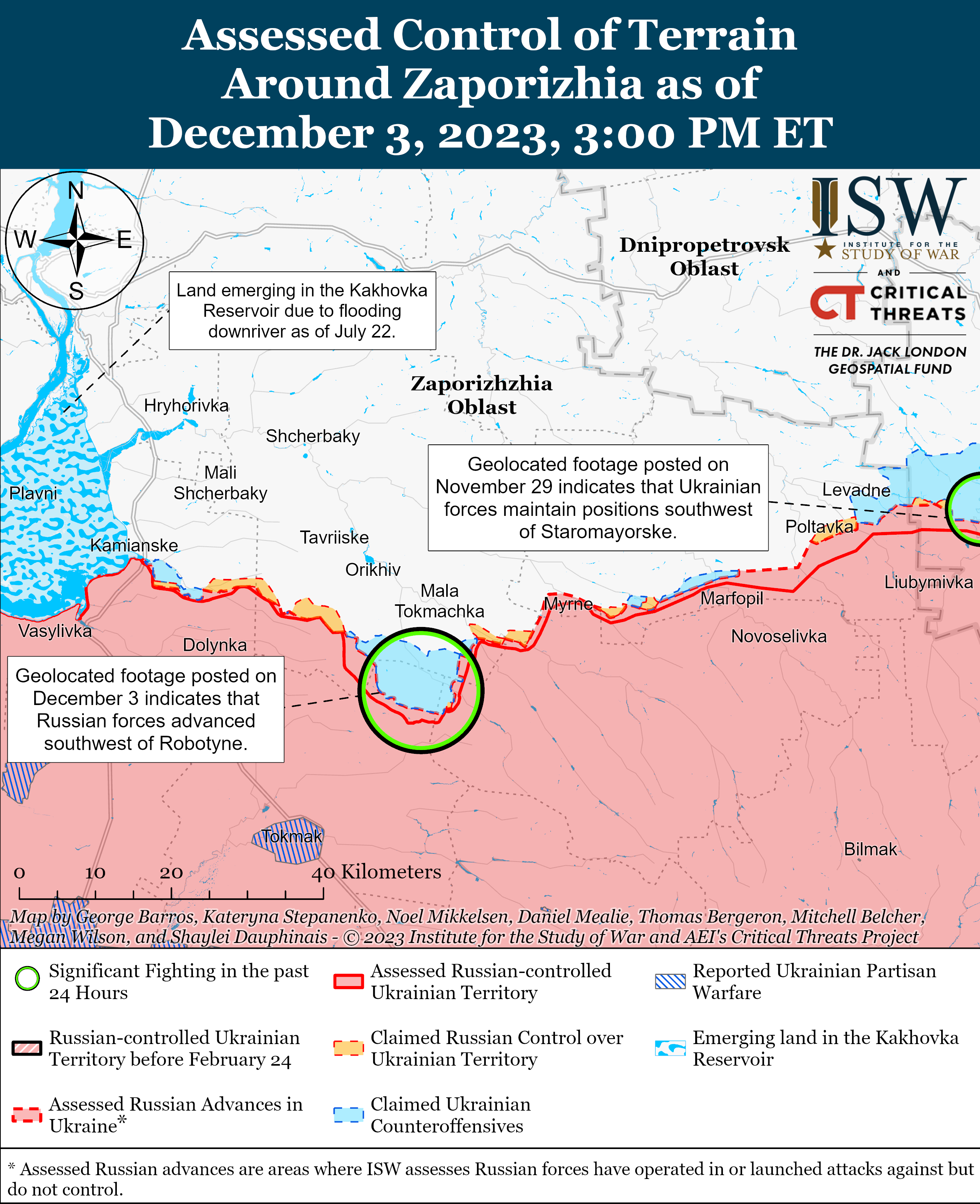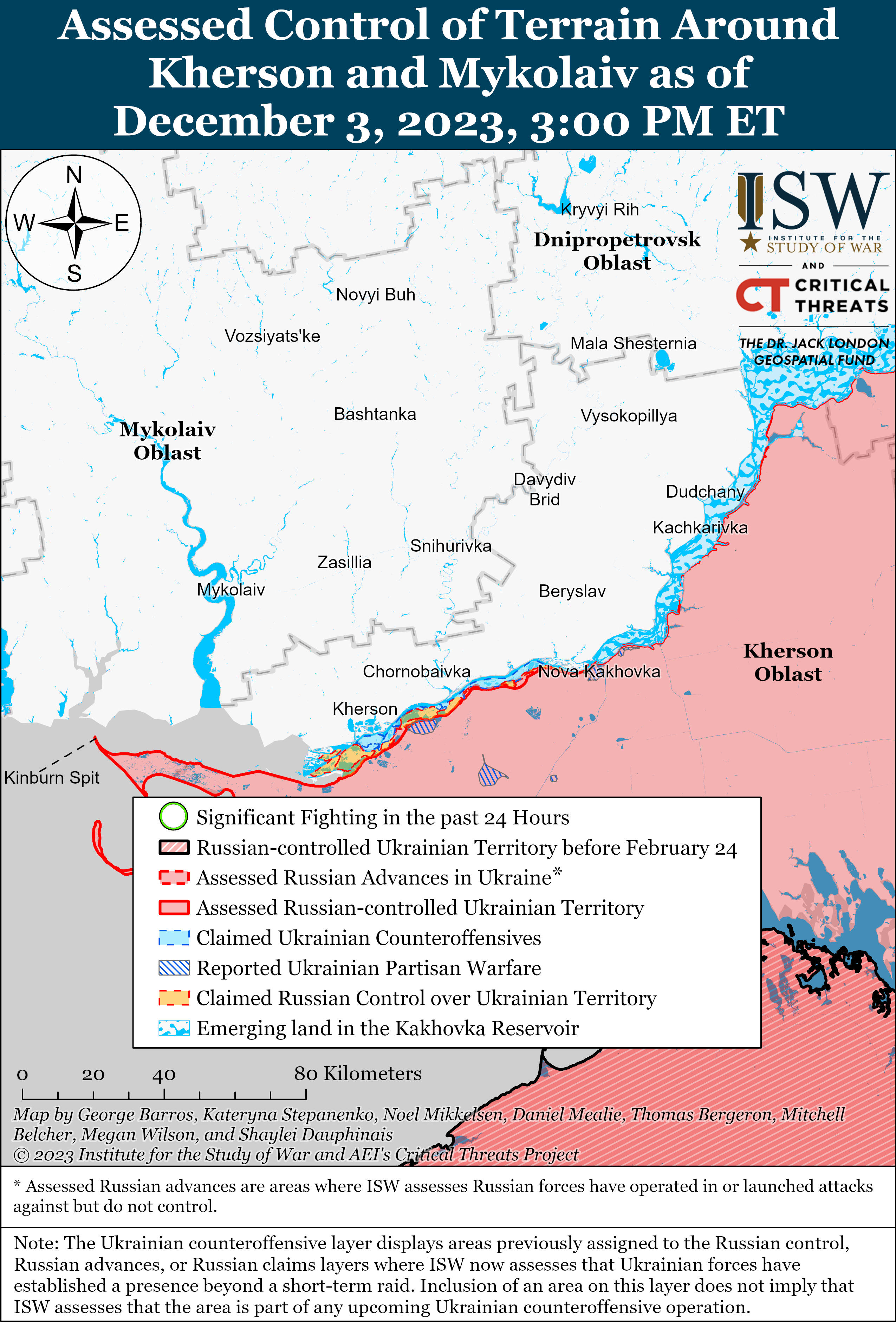Russian Offensive Campaign Assessment, December 3, 2023
Nicole Wolkov, Christina Harward, Riley Bailey, Grace Mappes, and Frederick W. Kagan
December 3, 2023, 5:25pm ET
Click here to see ISW’s interactive map of the Russian invasion of Ukraine. This map is updated daily alongside the static maps present in this report.
Click here to see ISW’s 3D control of terrain topographic map of Ukraine. Use of a computer (not a mobile device) is strongly recommended for using this data-heavy tool.
Click here to access ISW’s archive of interactive time-lapse maps of the Russian invasion of Ukraine. These maps complement the static control-of-terrain map that ISW produces daily by showing a dynamic frontline. ISW will update this time-lapse map archive monthly.
Note: The data cut-off for this product was 1:30pm ET on December 3. ISW will cover subsequent reports in the December 4 Russian Offensive Campaign Assessment.
Russian President Vladimir Putin’s December 1 decree is likely a formal recognition of the Russian military’s current end strength and not an order to immediately increase the number of Russian military personnel. Putin signed a decree on December 1 increasing the official end strength of the Russian military from 2.039 million personnel to 2.209 million personnel and total Russian combat personnel from 1.15 million to 1.32 million.[1] The increase of 170,000 Russian combat personnel between Putin’s previous August 25, 2022 decree and the December 1, 2023 decree is likely a formal acknowledgement of a net increase of 170,000 combat personnel between August 25, 2022, and December 1, 2023, and not a call to immediately increase the current number of combat personnel by an additional 170,000.[2] Russian Security Council Deputy Chairperson Dmitry Medvedev claimed on November 9 that the Russian military has recruited 410,000 contract, volunteer, and conscripted military personnel since January 1, 2023, then later claimed on December 1 that the Russian military has recruited over 452,000 personnel since January 1, 2023.[3] The Russian government announced in September 2022 that the Russian military would mobilize 300,000 personnel under Putin’s partial mobilization decree.[4] NATO Secretary General Jens Stoltenberg stated on November 29 that Russian forces have suffered over 300,000 casualties (killed and wounded personnel) in Ukraine since the start of Russia’s full-scale invasion of Ukraine in February 2022.[5] Ongoing widespread crypto-mobilization efforts (such as volunteer recruitment and the coercion of migrants into the Russian military), partial mobilization, the number of Russian personnel concluding military service, and Russian casualties in Ukraine plausibly account for a net 170,000-combat personnel increase between August 25, 2022, and December 1, 2023.[6] Putin’s December 1, 2023 decree is thus likely establishing 2.209 million personnel as the new official end strength rather than ordering a significant new increase in the total size of the Russian military.
Ukrainian air defense coverage along the front line is reportedly incentivizing Russian forces to rely more heavily on remote strikes with glide bombs. Ukrainian Tavriisk Group of Forces Spokesperson Colonel Oleksandr Shtupun stated on December 3 that Ukrainian forces shoot down Russian attack helicopters, such as Ka-52 and Mi-24 helicopters, as soon as they enter the range of Ukrainian air defense systems.[7] Shtupun stated that this Ukrainian air defense capability has prompted Russian forces to use Su-35 and Su-34 attack aircraft to launch remote strikes with glide bombs from 50 to 70 kilometers behind the line of combat engagement.[8] Russian forces effectively used helicopters to defend against Ukrainian counteroffensive operations in western Zaporizhia Oblast in summer 2023 but decreased the use of rotary wing aircraft following the downing of Ka-52 helicopters in the area in mid-August 2023.[9] Shtupun’s statements are consistent with these observations as well as with the increased Russian use of glide bombs throughout the frontline, particularly in southern Ukraine.[10]
Ukrainian Air Force Spokesperson Colonel Yuriy Ihnat stated on December 3 that Ukrainian air defenses are similarly prompting Russian forces to increase their use of KAB glide bombs because FAB glide bombs require Russian aircraft to fly within range of Ukrainian air defenses.[11] Ihnat added that KAB bombs are inaccurate and that Russian forces therefore launch a large number of the glide bombs to strike Ukrainian targets.[12] Ihnat stated that Russian aviation launches about 100 glide bombs on average at Ukrainian targets along the front line each day and stated that Ukraine needs long-range air defense systems and F-16 fighter jets to counter the current Russian aviation threat.[13]
The United Kingdom Ministry of Defense (UK MoD) reported that Russian air defense systems are also constraining Ukrainian operations along the front, specifically Russian SA-15 TOR short-range surface-to-air missile systems (SAMs).[14] The UK MoD reported that Russian forces use the SA-15 SAMs to provide cover for Russian ground forces at the front line and have effectively employed them to counter Ukrainian drone operations.[15]
Ukrainian officials appealed to international organizations to investigate video footage published on December 2 showing Russian forces killing surrendering and reportedly unarmed Ukrainian soldiers. A Russian source published footage on December 2 showing Russian forces shooting two Ukrainian soldiers after they surrendered near Stepove (3km northwest of Avdiivka).[16] Ukrainian Verkhovna Rada Human Rights Ombudsman Dmytro Lubinets appealed to the International Committee of the Red Cross and the United Nations to investigate this violation of international law, and Ukrainian Tavriisk Group of Forces Spokesperson Colonel Oleksandr Shtupun stated on December 3 that Ukrainian authorities will give the evidence of the war crime to the appropriate international institutions.[17] The Ukrainian Prosecutor General’s Office stated that the Security Service of Ukraine (SBU) has begun a pre-trial investigation for criminal proceedings for violations of the Ukrainian Criminal Code.[18] A few Russian milbloggers dismissed the video and the accusations against the Russian forces.[19] Attacking soldiers recognized as hors de combat, specifically including those who have clearly expressed an intention to surrender, is a violation of Article 41 of the Geneva Convention on the Protection of Victims of International Armed Conflicts.[20]
Russian forces launched a series of missile and drone strikes on the night of December 2 and 3. Ukrainian military officials reported that Russian forces launched 12 Shahed drones from Primorsko-Akhtarsk, Krasnodar Krai, and one Kh-59 missile from Belgorod Oblast and that Ukrainian air defenses shot down 10 of the drones over Mykolaiv and Khmelnytskyi oblasts as well as the Kh-59 missile.[21] The Ukrainian Air Force reported that Russian forces launched the drones in waves.[22] The Russian Ministry of Defense (MoD) claimed that Russian aviation, drones, missiles, and artillery struck a Ukrainian command post in Dnipropetrovsk Oblast; fuel depots near Myrhorod, Poltava Oblast and Khmelnytskyi City; and an ammunition depot in Mykolaiv Oblast.[23]
The Russian government is likely continuing attempts to censor relatives of mobilized Russian military personnel on social media out of concern about their protests’ possible negative effect on Russian President Vladimir Putin’s still unannounced 2024 presidential campaign. BBC Russia reported on December 3 that online bots using fake names and profile pictures accused the relatives of mobilized Russian personnel in their “Way Home” Telegram channel of having connections to imprisoned Russian opposition figure Alexei Navalny and his Anti-Corruption Foundation.[24] The “Way Home” group previously issued a manifesto on November 27 calling for the return of mobilized personnel and an end to “indefinite” mobilization.[25] Relatives of mobilized personnel have also repeatedly appealed to the Russian government and military for the release of their relatives from military service and for better treatment of mobilized servicemen in the Russian military, and the Russian government has made efforts to censor these demands and complaints and prevent relatives of mobilized personnel from protesting publicly.[26] Putin‘s presidential campaign will reportedly not focus on the war in Ukraine, and the Kremlin likely considers the relatives of mobilized personnel to be a social group that may pose one of the greatest threats to his campaign.[27]
A prominent Russian milblogger claimed to have given a “masterclass” to press heads and communications personnel at Russian stated-owned defense conglomerate Rostec, likely in support of an effort that allows the Russian government to normalize the war without directly involving the Kremlin. The Rybar Telegram channel claimed that its founder, Mikhail Zvinchuk, gave the “masterclass,” which involved an analysis of 23 Telegram accounts of Russian enterprises and a discussion on the importance of Telegram and other social media to achieve results.[28] Zvinchuk recommended that Rostec increase coverage of its production processes, modernize its approaches to publicizing their products, and humanize the corporation. Many of Rostec’s subsidiaries are involved in the Russian Ministry of Defense’s efforts to ramp up DIB production to support Russia’s long war effort in Ukraine.[29] Rostec and its subsidiaries using Telegram to promote DIB products would help normalize the revitalization of Russia’s DIB and the Russian long war effort to the Russian public without directly attributing this normalization to the Kremlin. The Kremlin has consistently failed to bring Russian society to a wartime footing and is unlikely to do so in the near term as the Kremlin reportedly seeks to downplay the war as it prepares for the 2024 Russian presidential elections.[30]
The milblogger’s “masterclass” represents an avenue by which the Kremlin can further benefit from milbloggers and shows how possible financial incentives could temper milbloggers’ criticisms of the Russian leadership. The Kremlin has sought to appeal to select milbloggers, including Rybar, and Zvinchuk is the only prominent Russian milblogger to receive a state award from Russian President Vladimir Putin for war reporting.[31] The Kremlin has consistently struggled to conduct effective information operations inside Russia since the start of the full-scale invasion and may seek to use more milbloggers to help improve the Kremlin’s conduct of its information operations directed at domestic audiences.[32] Rybar publishes calls for donations multiple times per week and has also advertised companies affiliated with Russian Presidential Administration First Deputy Head Sergei Kiriyenko and Russian media.[33] ISW previously assessed that milbloggers’ reliance on advertisements for an income provides a financial incentive to refrain from criticizing the Kremlin as attempted censorship and legal issues may deter advertisement deals.[34] Consultations with Russian officials on public messaging and information operations could become an additional source of income for select milbloggers, which would likely lead to further self-censorship.
Key Takeaways:
- Russian President Vladimir Putin’s December 1 decree is likely a formal recognition of the Russian military’s current end strength and not an order to immediately increase the number of Russian military personnel.
- Ukrainian air defense coverage along the front line is reportedly incentivizing Russian forces to rely more heavily on remote strikes with glide bombs.
- Ukrainian officials appealed to international organizations to investigate video footage published on December 2 showing Russian forces killing surrendering and reportedly unarmed Ukrainian soldiers.
- Russian forces launched a series of missile and drone strikes on the night of December 2 and 3.
- The Russian government is likely continuing attempts to censor relatives of mobilized Russian military personnel on social media out of concern about their protests’ possible negative effect on Russian President Vladimir Putin’s still unannounced 2024 presidential campaign.
- A prominent Russian milblogger claimed to have given a “masterclass” to press heads and communications personnel at Russian stated-owned defense conglomerate Rostec, likely in support of an effort that allows the Russian government to normalize the war without directly involving the Kremlin.
- The milblogger’s “masterclass” represents an avenue by which the Kremlin can further benefit from milbloggers and shows how possible financial incentives could temper milbloggers’ criticisms of the Russian leadership.
- Russian forces conducted offensive operations along the Kupyansk-Svatove-Kreminna line, near Bakhmut, near Avdiivka, west and southwest of Donetsk City, in the Donetsk-Zaporizhia Oblast border area, and in western Zaporizhia Oblast and advanced near Avdiivka.
- Russia continues to use the Russian Orthodox Church (ROC) to indoctrinate Russian children into Russian nationalism and set conditions for long-term force generation efforts.
- Russian occupation officials continue to strengthen the Kremlin-backed United Russia party in occupied Ukraine ahead of the March 2024 Russian presidential elections.
We do not report in detail on Russian war crimes because these activities are well-covered in Western media and do not directly affect the military operations we are assessing and forecasting. We will continue to evaluate and report on the effects of these criminal activities on the Ukrainian military and the Ukrainian population and specifically on combat in Ukrainian urban areas. We utterly condemn Russian violations of the laws of armed conflict and the Geneva Conventions and crimes against humanity even though we do not describe them in these reports.
- Russian Main Effort – Eastern Ukraine (comprised of two subordinate main efforts)
- Russian Subordinate Main Effort #1 – Capture the remainder of Luhansk Oblast and push westward into eastern Kharkiv Oblast and encircle northern Donetsk Oblast
- Russian Subordinate Main Effort #2 – Capture the entirety of Donetsk Oblast
- Russian Supporting Effort – Southern Axis
- Russian Mobilization and Force Generation Efforts
- Russian Technological Adaptations
- Activities in Russian-occupied areas
- Russian Information Operations and Narratives
Russian Main Effort – Eastern Ukraine
Russian Subordinate Main Effort #1 – Luhansk Oblast (Russian objective: Capture the remainder of Luhansk Oblast and push westward into eastern Kharkiv Oblast and northern Donetsk Oblast)
Russian forces continued offensive operations along the Kupyansk-Svatove-Kreminna line on December 3 but did not make confirmed gains. The Ukrainian General Staff reported that Ukrainian forces repelled Russian attacks northeast of Petropavlivka (7km east of Kupyansk) and near Synkivka (9km northeast of Kupyansk), Ivanivka (20km southwest of Kupyansk), Stelmakhivka (15km northwest of Svatove), and the Serebryanske forest area (10km south of Kreminna).[35] Russian milbloggers claimed that Russian forces advanced toward Ivanivka, near Torske (15km west of Kreminna), and in the Serebryanske forest area on December 2 and 3.[36] A Russian milblogger claimed that Russian forces continue attacking near Synkivka and Kyslivka (20km southeast of Kupyansk) but have not made substantial progress in the past several months.[37] The Russian “Russkiy Legion” (BARS-13) irregular armed formation claimed that Russian forces attacked south of Dibrova (7km southwest of Kreminna).[38] Footage published on December 3 purportedly shows elements of the 123rd Motorized Rifle Brigade (2nd Luhansk People’s Republic [LNR] Army Corps) operating near Berestove (30km south of Kreminna).[39]
Ukrainian forces continued localized ground attacks near Kreminna on December 3 and recently made a confirmed advance. Footage published on November 29 and geolocated on December 2 indicates that Ukrainian forces recently advanced west of Dibrova.[40] The Russian Ministry of Defense (MoD) and other Russian sources claimed that Russian forces repelled Ukrainian attacks near Synkivka, Yampolivka (17km west of Kreminna), Torske, and the Serebryanske forest area.[41]
Russian Subordinate Main Effort #2 – Donetsk Oblast (Russian objective: Capture the entirety of Donetsk Oblast, the claimed territory of Russia’s proxies in Donbas)
Ukrainian forces continued ground attacks near Bakhmut on December 3 but did not make any confirmed gains. The Ukrainian General Staff reported that Ukrainian forces continued assault actions south of Bakhmut.[42] The Russian Ministry of Defense (MoD) claimed that Ukrainian forces unsuccessfully attacked near Klishchiivka (7km southwest of Bakhmut).[43]
Russian forces conducted offensive operations near Bakhmut but did not make any confirmed advances on December 3. Russian sources claimed on December 2 that Russian forces advanced south of the Berkhivka reservoir (about 2km northwest of Bakhmut), towards Ivanivske (6km west of Bakhmut), east of Klishchiivka, and near Andriivka (10km southwest of Bakhmut).[44] The Ukrainian General Staff reported that Russian forces unsuccessfully attacked near Bohdanivka, Ivanivske, Klishchiivka, and Andriivka.[45] A Russian milblogger claimed that Russian forces also attacked from Dubovo-Vasylivka (6km northwest of Bakhmut) towards Hryhorivka (9km northwest of Bakhmut).[46] A Russian source claimed that elements of the Russian 58th Spetsnaz Battalion (Donetsk People’s Republic [DNR] 1st Army Corps) are operating in the Bakhmut direction.[47] Chechen Republic Head Ramzan Kadyrov claimed that the “Shustryi” detachment of the Chechen ”Akhmat” Spetsnaz and elements of the Russian 4th Motorized Rifle Brigade (Luhansk People‘s Republic [LNR] 2nd Army Corps) are operating near Klishchiivka.[48]
Russian forces conducted offensive operations near Avdiivka on December 3 and recently made confirmed advances. Footage published on November 28 and geolocated on December 2 indicates that Russian forces advanced west of the railway north of Stepove (3km northwest of Avdiivka).[49] Additional geolocated footage published on December 2 indicates that Russian forces advanced southwest of Pervomaiske (10km southwest of Avdiivka).[50] Russian milbloggers claimed on December 2 and 3 that Russian forces advanced south and southeast of Stepove, with some Russian milbloggers claiming that Russian forces advanced 300 meters near the settlement.[51] Russian milbloggers also claimed on December 2 and 3 that Russian forces advanced south of Novokalynove (13km northeast of Avdiivka) and west of Krasnohorivka (5km northwest of Avdiivka) on Avdiivka’s northern flank as well as on the southern flank near Pervomaiske and Sieverne (6km west of Avdiivka).[52] The Ukrainian General Staff reported that Russian forces unsuccessfully attacked east of Novobakhmutivka (9km northwest of Avdiivka) and Novokalynove; south of Tonenke (5km west of Avdiivka); and near Stepove, Avdiivka, Sieverne, and Pervomaiske.[53] Russian sources claimed on December 3 that Russian forces also attacked on the northern flank from Kamianka (5km northeast of Avdiivka) and on the southern flank near the industrial zone southwest of Avdiivka.[54] A Russian milblogger claimed on December 2 that Russian forces are conducting reconnaissance-in-force operations and are regrouping to resume assault operations near the industrial zone southeast of Avdiivka.[55] Ukrainian Avdiivka Military Administration Head Vitaliy Barabash stated on December 3 that Russian forces opened two additional directions of attack on the industrial zone southeast of Avdiivka and from Spartak (4km south of Avdiivka) during the third wave of assaults on Avdiivka in order to distract Ukrainian forces.[56] Barabash also stated that Russian forces are waiting for weather conditions to improve in order to use heavy equipment in assaults again.
Russian forces conducted offensive operations west and southwest of Donetsk City but did not make any confirmed advances on December 3. The Ukrainian General Staff reported that Russian forces unsuccessfully attacked near Marinka (on the western outskirts of Donetsk City) and Novomykhailivka (10km southwest of Donetsk City) and southeast of Vuhledar (30km southwest of Donetsk City).[57] A Russian milblogger claimed that Russian forces attacked in Marinka but that there were no significant changes.[58] A Russian source claimed that Russian forces are pushing Ukrainian forces out of the outskirts of Marinka, and another Russian source claimed that Russian forces have almost taken control of the settlement but must still overcome long-prepared Ukrainian defenses in the area.[59] Ukrainian Tavriisk Group of Forces Spokesperson Colonel Oleksandr Shtupun stated that claims about Russian advances in Marinka are not true.[60]
A Russian source claimed that Ukrainian forces counterattacked west of Donetsk City in Marinka on December 2 but did not specify an outcome.[61]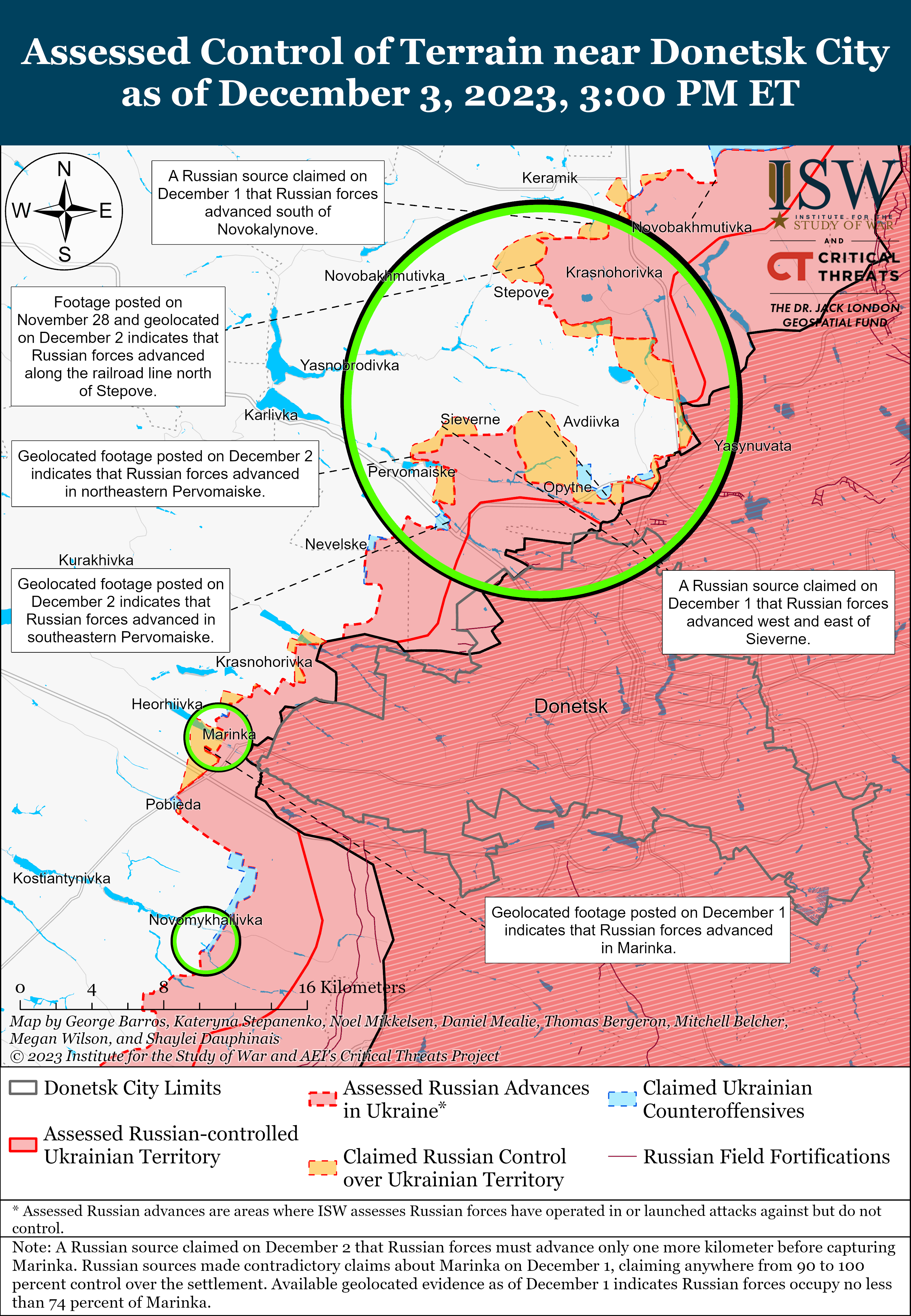
Russian Supporting Effort – Southern Axis (Russian objective: Maintain frontline positions and secure rear areas against Ukrainian strikes)
Russian forces continued limited ground attacks in the Donetsk-Zaporizhia Oblast border area on December 3 but did not make any confirmed advances. The Ukrainian General Staff reported that Ukrainian forces repelled a Russian assault near Staromayorske (9km south of Velyka Novosilka).[62] A Russian milblogger posted footage purporting to show elements of the Russian 36th Combined Arms Army (Eastern Military District) striking Ukrainian forces in Urozhaine (9km south of Velyka Novosilka).[63]
Ukrainian forces continued counteroffensive operations in western Zaporizhia Oblast on December 3 but did not make any confirmed gains. The Ukrainian General Staff reported that Ukrainian forces continued offensive operations in the Melitopol (western Zaporizhia Oblast) direction.[64] Russian sources, including the Russian Ministry of Defense (MoD), claimed that Russian forces repelled small Ukrainian infantry assaults near Robotyne and Novoprokopivka (3km south of Robotyne) and northwest of Verbove (9km east of Robotyne).[65] Russian milbloggers claimed on December 2 and 3 that Ukrainian forces retain the initiative in the Robotyne area and that Russian forces are still conducting an elastic defense.[66]
Russian forces continued to counterattack in western Zaporizhia Oblast on December 3 but did not make any confirmed advances. The Ukrainian General Staff reported that Ukrainian forces repelled Russian counterattacks south of Robotyne, northwest of Verbove, and near Novopokrovka (12km northeast of Robotyne).[67] A Russian milblogger amplified footage purporting to show elements of the Russian 76th Airborne (VDV) Division capturing a Ukrainian stronghold near Robotyne.[68] A Russian milblogger claimed on December 2 that VDV assault groups pushed Ukrainian forces out of unspecified positions north of Verbove.[69]
Ukrainian forces continued ground operations in east (left) bank Kherson Oblast on December 3 but did not make any confirmed gains. The Ukrainian General Staff reported that Ukrainian forces maintain positions on the east bank and are conducting counterbattery fire in the area.[70] Russian milbloggers claimed that meeting engagements continued near Krynky (30km northeast of Kherson City and 2km from the Dnipro River) but that the tempo of fighting has decreased due to fog and rain.[71] Russian milbloggers claimed on December 2 and 3 that Ukrainian forces continued attempts to transfer reinforcements and supplies to positions on the left bank of the Dnipro River.[72]
The consequences of the November 27 cyclone in the Black Sea continue to impact Russian military infrastructure in left bank Kherson Oblast and occupied Crimea. Ukrainian research group Center for Journalistic Investigations reported on December 2 that satellite imagery shows that recent storms washed away the spit connecting Dzharylhach Island to occupied Kherson Oblast in three places.[73] Ukrainian officials reported in May 2023 that Russian forces were filling the crossing to Dzharylhach Island with sand to create a more stable connection between occupied Kherson Oblast and the island, where Russian forces reportedly were forming a training ground for mobilized personnel.[74] Satellite imagery posted on December 2 shows that recent storms damaged several Russian fortifications at the entrance of the Sevastopol harbor in occupied Crimea.[75]
Russian sources claimed that Russian air defense intercepted two Ukrainian S-200 missiles targeting Krasnodar Krai over the Sea of Azov on December 2.[76] Krasnodar City Mayor Yevgeny Naumov claimed that there were two explosions in Krasnodar Krai far away from Krasnodar City.[77]
Russian Mobilization and Force Generation Efforts (Russian objective: Expand combat power without conducting general mobilization)
Russia continues to use the Russian Orthodox Church (ROC) to indoctrinate Russian children into Russian nationalism and set conditions for long-term force generation efforts. The ROC’s Moscow Patriarchate Publishing House is selling a children’s novel To Live: To Serve the Motherland that prepares children to serve in the Russian military using nationalist and religious ideals.[78] The book includes chapters about: “Holy Fathers on War, Peace, and the Russian Military;” “There is No Life in War without Digging;” “Combat Training: Strength, Bravery, and Dexterity,” and “Russian Land is All under God.”[79]
Russian Technological Adaptations (Russian objective: Introduce technological innovations to optimize systems for use in Ukraine)
Russian MLRS manufacturer NPO Splav, a subsidiary of Russian state-owned defense conglomerate Rostec, has patented a new MLRS projectile that reportedly has an extended range and is supersonic. Russian state newswire TASS reported that it obtained the patent, which claims that the new projectile has improved aerodynamic characteristics, accuracy, and firing range.[80] TASS did not report the exact specifications or name of the new projectile.
Russian forces on the frontline are likely employing new adaptations to protect themselves from Ukrainian drones and loitering munitions. Ukrainian journalist Yuriy Butusov and a Russian milblogger amplified images on December 3 of Russian soldiers using mobile frame “cocoons” of thermal blankets camouflaged with grass, dirt, and tree branches in the Vuhledar direction in Donetsk Oblast.[81] Butusov and the milblogger claimed that the “cocoons” hide soldiers’ thermal signatures and protect against drone strikes.
Activities in Russian-occupied areas (Russian objective: Consolidate administrative control of annexed areas; forcibly integrate Ukrainian citizens into Russian sociocultural, economic, military, and governance systems)
Russian occupation officials continue to strengthen the Kremlin-backed United Russia party in occupied Ukraine ahead of the March 2024 Russian presidential elections. Kherson Oblast occupation head Vladimir Saldo participated in a conference for Kherson Oblast’s United Russia branch in occupied Henichesk on December 2 and claimed that there are 6,500 United Russia members and supporters in occupied Kherson Oblast, including 200 oblast-level and local-level officials.[82] The Ukrainian Resistance Center reported on November 3 that Russian occupation officials are attempting to use United Russia activities in occupied Ukraine to generate support among locals and legitimize the Russian occupation.[83]
The Ukrainian Resistance Center reported on December 3 that Russian occupation authorities forcibly deported 100 Ukrainians from occupied Kherson Oblast to Russia under evacuation schemes in November 2023.[84] Russian occupation officials routinely use the guise of evacuations, medical treatment, vacation opportunities, and educational programs to deport residents from occupied Ukraine to Russia.[85]
Russian Information Operations and Narratives
Pro-Kremlin actors are amplifying reports of Ukrainian social and governmental division, specifically those involving Ukrainian President Volodymyr Zelensky, to discredit Ukrainian leadership and weaken Western support for Ukraine. The Ukrainian Main Military Intelligence Directorate (GUR) and Ukrainian Security Service (SBU) warned about renewed Russian efforts to spread propaganda to reduce support for Ukraine and split Ukrainian society from within by fostering mistrust between government officials and between civilians and the government.[86] This effort is congruent with the erroneous pre-war Kremlin understanding of the Ukrainian government, namely that Ukrainians did not support their government and would welcome Russia’s attempt at regime change, that likely influenced Russian decision-making to conduct the 2022 full-scale invasion.[87] This new wave of Russian information operations is therefore part of an existing narrative line that Russian actors are promoting towards a new aim. The GUR and SBU reported that Russian sources specifically intend to sow mistrust in Ukrainian state bodies that organize prisoner of war exchanges (POWs) and hope to garner Ukrainian support for a negotiated settlement with Russia to freeze the frontlines. Domestic tensions are not unusual while sustaining a war effort, particularly in a free country with a robust civil society facing a protracted and difficult conflict like the one in Ukraine.
Significant activity in Belarus (Russian efforts to increase its military presence in Belarus and further integrate Belarus into Russian-favorable frameworks and Wagner Group activity in Belarus)
Belarusian President Alexander Lukashenko arrived in Beijing, China on December 3 and will meet with Chinese President Xi Jinping on December 3 and 4 to discuss trade, economic investment, and international cooperation.[88]
Note: ISW does not receive any classified material from any source, uses only publicly available information, and draws extensively on Russian, Ukrainian, and Western reporting and social media as well as commercially available satellite imagery and other geospatial data as the basis for these reports. References to all sources used are provided in the endnotes of each update.
[7] https://www.rbc dot ua/rus/news/rosiyski-kabi-stali-realnoyu-problemoyu-ukrayini-1701600956.html
[8] https://www.rbc dot ua/rus/news/rosiyski-kabi-stali-realnoyu-problemoyu-ukrayini-1701600956.html
[11] https://www.ukrinform dot ua/rubric-ato/3795223-povitrani-sili-kabi-stali-realnou-problemou-aknajsvidse-potribni-f16.html ; https://suspilne dot media/631074-ignat-kabi-stali-realnou-problemou-potribni-dalekobijni-sistemi-ppo-i-akomoga-svidse-f-16/
[12] https://suspilne dot media/631074-ignat-kabi-stali-realnou-problemou-potribni-dalekobijni-sistemi-ppo-i-akomoga-svidse-f-16/ ; https://www.ukrinform dot ua/rubric-ato/3795223-povitrani-sili-kabi-stali-realnou-problemou-aknajsvidse-potribni-f16.html
[13] https://suspilne dot media/631074-ignat-kabi-stali-realnou-problemou-potribni-dalekobijni-sistemi-ppo-i-akomoga-svidse-f-16/
[78] https://www.gazeta dot ru/culture/news/2023/12/02/21834343.shtml; https://rop dot ru/shop/product/zhit-rodine-sluzhit-russkie-poslovicy-i-pogovorki-citaty-iz-svyaschennogo-pisaniya-nastavleniya-svyatyh-otcov-izrecheniya


